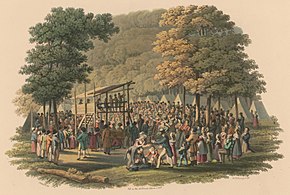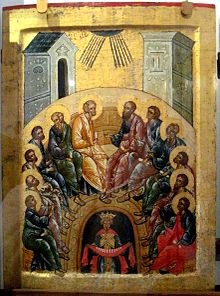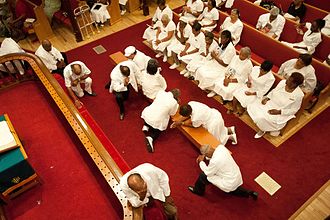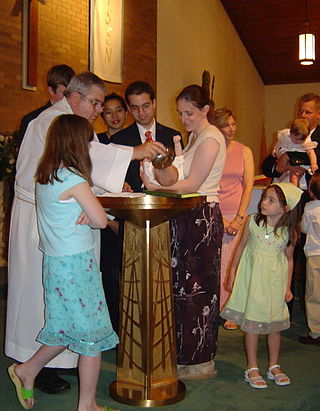Biblical description
Old Covenant background
In Christian theology, the work of the Holy Spirit under the Old Covenant is viewed as less extensive than that under the New Covenant inaugurated on the day of Pentecost. [5] The Spirit was restricted to certain chosen individuals, such as high priests and prophets. [6] Often termed the "spirit of prophecy" in rabbinic writings, the Holy Spirit was closely associated with prophecy and divine inspiration. [7] It was anticipated that in the future messianic age God would pour out his spirit upon all of Israel, which would become a nation of prophets. [8] [9]
Canonical gospels
While the exact phrase "baptism with the Holy Spirit" is not found in the New Testament, two forms of the phrase are found in the canonical gospels using the verb "baptize", from the Greek word baptizein meaning to "immerse" or "plunge". [10] The baptism was spoken about by John the Baptist, who contrasted his water baptism for the forgiveness of sins with the baptism of Jesus. In Mark 1:8 and John 1:33, the Baptist proclaimed that Jesus "will baptize in (the) Holy Spirit"; while in Matthew 3:11 and Luke 3:16, he "will baptize with Holy Spirit and fire". [11]
Jesus is considered the first person to receive the baptism with the Holy Spirit. [12] The Holy Spirit descended on Jesus during his baptism (Luke 3:21–22). After his baptism, Jesus goes into the wilderness and is tempted; however, he "returned in the power of the Spirit" (Luke 4:14). Afterward, Jesus began his ministry and displayed his power by casting out demons, healing the sick, and teaching with authority (Luke 4:16–44). [13]
Acts of the Apostles
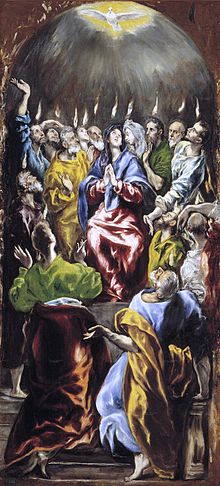
The phrase "baptized in the Holy Spirit" occurs two times in Acts of the Apostles, first in Acts 1:4–5 and second in Acts 11:16. Other terminology is used in Acts to indicate Spirit baptism, such as "filled" (Acts 2:4). "Baptized in the Spirit" indicates an outward immersion into the reality of the Holy Spirit, while "filled with the Spirit" suggests an internal diffusion. Both terms speak to the totality of receiving the Spirit. [14]
The baptism with the Holy Spirit is described in various places as the Spirit "poured out upon" (Acts 2:17–18, 33), "falling upon" (Acts 10:44), "coming upon" (Acts 1:8; 8:16; 19:6) people. [15] To "pour out" suggests abundance and reflects John 3:34,"God gives the Spirit without limit". Another expression, "come upon" is related to a statement by Jesus in Luke 24:49, "I am sending the promise of my Father upon you. But stay in the city until you are clothed with power from on high". The language of "come on" and "clothed with" suggest possession by and endowment with the Holy Spirit. [14]
The narrative of Acts begins after Jesus' crucifixion and resurrection. The resurrected Jesus directed his disciples to wait in Jerusalem for the baptism in the Holy Spirit and promised, "you will receive power when the Holy Spirit has come upon you, and you will be my witnesses in Jerusalem and in all Judea and Samaria, and to the end of the earth" (Acts 1:8). After his ascension, Jesus was given authority from the Father to pour out the Holy Spirit (Acts 2:33). [13]
In the New Testament, the messianic expectations found in early Judaism were fulfilled on the day of Pentecost as recorded in Acts 2:1–41. The Christian community was gathered together in Jerusalem when a sound from heaven like rushing wind was heard and tongues like tongues of flame rested on everyone. They were filled with the Holy Spirit and began to speak in tongues, miraculously praising God in foreign languages. A crowd gathered and was addressed by the Apostle Peter who stated that the occurrence was the fulfillment of the prophecy of Joel 2, "And in the last days it shall be, God declares, that I will pour out my Spirit on all flesh, and your sons and your daughters shall prophesy". Peter then explained how the Spirit came to be poured out, recounting Jesus' ministry and passion and then proclaiming his resurrection and enthronement at the right hand of God. In response, the crowd asked Peter what they should do. He responded that they should repent and be baptized for the forgiveness of sins in order to receive the gift of the Holy Spirit. Peter finished his speech stating that the promise "is for you and for your children and for all who are far off, everyone whom the Lord our God calls to himself" (Acts 2:39). [6]
Baptism in the Holy Spirit occurs elsewhere in Acts. The gospel had been proclaimed in Samaria and the apostles Peter and John were sent from Jerusalem. The new believers had been baptized in water, but the Holy Spirit had not yet fallen on them. The Samaritans received the Holy Spirit when Peter and John laid their hands on them (Acts 8:14–18) The Apostle Paul was also filled with the Holy Spirit when Ananias of Damascus laid hands on him, and afterwards Paul was baptized with water (Acts 9:17–19).
Later in Acts, Peter preached the gospel to the household of Cornelius the Centurion, a gentile. While he preached, the Holy Spirit fell on the gentiles, and they began to speak in tongues. The Jewish believers with Peter were amazed, and the household was water baptized (Acts 10:44–48). While the apostle Paul was in Ephesus, he found disciples there and discovered that they did not know of the existence of the Holy Spirit and had only received John the Baptist's baptism. After baptizing them in Jesus' name, Paul laid his hands on them, and they began to speak in tongues and prophesy (Acts 19:1–7).
